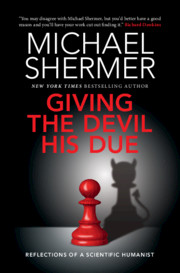Book contents
- Giving the Devil His Due
- Giving the Devil His Due
- Copyright page
- Dedication
- Contents
- Acknowledgments
- Introduction Who Is the Devil and What Is He Due?
- Part I The Advocatus Diaboli: Reflections on Free Thought and Free Speech
- Chapter 1 Giving the Devil His Due
- Chapter 2 Banning Evil
- Chapter 3 Free Speech Even If It Hurts
- Chapter 4 Free to Inquire
- Chapter 5 Ben Stein’s Blunder
- Chapter 6 What Went Wrong?
- Part II Homo Religiosus: Reflections on God and Religion
- Part III Deferred Dreams: Reflections on Politics and Society
- Part IV Scientia Humanitatis: Reflections on Scientific Humanism
- Part V Transcendent Thinkers: Reflections on Controversial Intellectuals
- Notes
- Index
Chapter 4 - Free to Inquire
The Evolution–Creationism Controversy as a Test Case in Equal Time and Free Speech
from Part I - The Advocatus Diaboli: Reflections on Free Thought and Free Speech
Published online by Cambridge University Press: 28 February 2020
- Giving the Devil His Due
- Giving the Devil His Due
- Copyright page
- Dedication
- Contents
- Acknowledgments
- Introduction Who Is the Devil and What Is He Due?
- Part I The Advocatus Diaboli: Reflections on Free Thought and Free Speech
- Chapter 1 Giving the Devil His Due
- Chapter 2 Banning Evil
- Chapter 3 Free Speech Even If It Hurts
- Chapter 4 Free to Inquire
- Chapter 5 Ben Stein’s Blunder
- Chapter 6 What Went Wrong?
- Part II Homo Religiosus: Reflections on God and Religion
- Part III Deferred Dreams: Reflections on Politics and Society
- Part IV Scientia Humanitatis: Reflections on Scientific Humanism
- Part V Transcendent Thinkers: Reflections on Controversial Intellectuals
- Notes
- Index
Summary
This article first appeared as a book chapter in the <italic>Handbook of Philosophy and Public Policy</italic>, edited by David Boonin and published by Palgrave in 2018. I was tasked with finding a test case of freedom of speech and inquiry from the sciences, in the larger context of free speech issues as related to public policy and the law. I have already written extensively about evolution and creationism, most notably in my 1997 book <italic>Why People Believe Weird Things</italic> and my 2006 book <italic>Why Darwin Matters</italic>, so here I engage the creationist movement as a free speech issue inasmuch as its proponents hold a minority viewpoint as far as the scientific community is concerned. Nevertheless, I contend that they should be free to believe, teach (and preach) whatever they like about the origins and diversity of life, and that, in the well-trodden principle, sunlight is the best disinfectant (to which Supreme Court Justice Louis Brandeis added “electric light the most efficient policeman”).
Keywords
- Type
- Chapter
- Information
- Giving the Devil his DueReflections of a Scientific Humanist, pp. 44 - 54Publisher: Cambridge University PressPrint publication year: 2020

